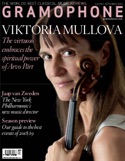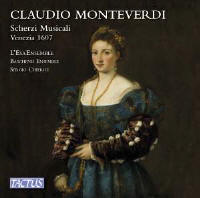Texte paru dans: / Appeared in: |
|
|
Outil de traduction (Très approximatif) |
|
|
Reviewer: Iain Fenlon For Claudio Monteverdi 1607 was a devastating year. February saw the premiere of his first opera, Orfeo, and then just six months later his wife Claudia died after a long illness. It may well have been the trials and tribulations of these hard months that caused his brother Giulio Cesare to step forward and assemble the Scherzi musicali, a sequence of 17 threevoice strophic songs (two by Giulio Cesare himself), together with a final balletto. As the accompanying Dichiarazione reveals, Claudio’s pieces, which are similar in style to the balletti of his colleague at the court of Mantua Giacomo Gastoldi, were composed some years earlier, after the composer’s return from a journey to Flanders. Despite their apparent simplicity (the term scherzo signifies light-hearted courtly entertainments rather than merely ‘musical jokes’ in the Mozartian sense), Monteverdi provides quite detailed performance instructions. Each strophe is preceded and then followed by an instrumental ritornello (these are also in three parts), and it is this arrangement rather than any specific singing style that is probably meant by the much-debated term canto alla francese. The 1607 Scherzi (a second set followed in 1632), essentially playful in mood, are scored for two sopranos and bass, and need to be given the light touch which allows the largely syllabic word setting and infectious hemiola rhythms (portents of Orfeo) to speak directly. Fast and furious improvised ornamentation has become the norm in performances of early 17th-century instrumental music, and might even be forgiven in some circumstances, but the lavish and frequently changing instrumentation of the Baschenis Ensemble (it includes, in addition to the two specified violins, flutes, percussion, baroque guitar, theorbo, organ and harpsichord) is reminiscent of an earlier age of interpretation. That, plus the decision not to sing the Scherzi with one voice to a part, undermines the simple textures and careful balances of Monteverdi’s conception and is ultimately to the detriment of the music’s intimate and sensual character. |
|




